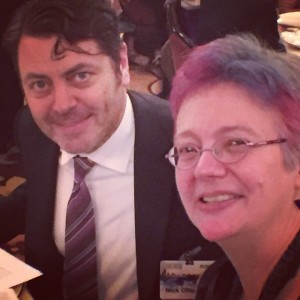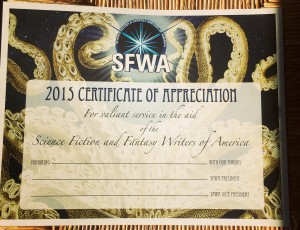
Want access to a lively community of writers and readers, free writing classes, co-working sessions, special speakers, weekly writing games, random pictures and MORE for as little as $2? Check out Cat’s Patreon campaign.

"(On the writing F&SF workshop) Wanted to crow and say thanks: the first story I wrote after taking your class was my very first sale. Coincidence? nah….thanks so much."

Starting the Nebula Weekend Off, or Friday Begins on Wednesday
Wednesday I flew in and lucked out: Kate Baker, SFWA’s awesome Operations Director, and I arrived around the same time, so we shared a taxi in. That was an experience in and of itself — the driver driving on the shoulder of the road, more than once, while Tagore songs blasted us and we shouted conversation over the roar of the wind through the window I couldn’t roll up. We arrived at the Palmer House unscathed.
Thursday I spent the day in the SFWA board meeting. We have board meetings face to face twice a year as well as the ongoing session on the discussion boards and assorted video calls. The board meetings are a nice chance to talk out stuff quickly, so we covered a wide range of things. I have a certain impatience with meetings engrained from years in academia and the corporate world, but Kate Baker had arranged to have enough coffee and food there to sustain us, and there are definitely worse people to be stuck in a room all day with. 😉
Alinea and the Meal of a Lifetime
If you are not interested in food, I suggest skipping ahead to the next section.
I’d been told it would be like having dinner in a Jack Vance novel and aside from a general lack of IUON stones, this was pretty close.
That evening I went off to Alinea, along with Scott Edelman (the party organizer), Ellen Datlow, Barry Goldblatt, Sam Miller Jr. and Sheila Williams. I have never had a meal as beautifully composed and choreographed. Here are some pics. The overall meal was fourteen courses and took four hours, which passed with amazing speed.
Here are the pictures:
Here’s Scott’s account of the evening, with more details.
Back to Reality, Whoops There Goes Gravity
Wayne arrived late that evening. The next morning I headed off to programming and he went for his own Edelman adventure, accompanying Scott for doughnuts (it was National Doughnut Day). (Advice: always say yes if Scott asks you to eat with him.)
My first panel was SFWA Through the Years, along with past and current SFWA presidents Greg Bear, Michael Capobianco, Russell Davis, and Steven Gould. Mainly I just shut up and listened; the more of SFWA’s convoluted history I know, the better. 😉
At 2:30 PM I was on the Diversifying Your Income Stream, along with Eric Flint (who I had never met before but am a longtime fan of), Mary Anne Mohanraj, and Steven Gould. I mainly talked about Patreon and teaching; Eric and Steven also talked about e-publishing one’s backlist, selling film and game rights, and writing nonfiction. I was sorry to miss the What SFWA Can Do For You panel that was going on at the same time with Kate Baker, Lee Martindale, Sarah Pinsker, and Bud Sparhawk — any chance someone taped it?

After that we headed off to the mass autographing. I had Matthew Johnson on one side and Bruce Holmes on the other, and also got a chance to chat with some folks here and there. WordFire Press had sent along some copies of Beasts of Tabat (Newer writers, this is one way a press shows they believe not just in your book but your career with them, and it is deeply appreciated) so there were some books to sign, along with a number of copies of the SFWA Cookbook.
Speaking of which, it was a big hit! It made a nice way to collect autographs, particularly with Larry Niven, our new grandmaster, having provided his instructions for running a coffee bar at a convention. We’ve sold a number of copies (Connie Willis bought 5!), and may end up doing another print run past our original 1000 copies. All proceeds go to benefit SFWA’s Legal Fund. You can still order it online. (Contributors, I am mailing you in the next couple of days about your copies, which should go out at the end of the month.) Fran Wilde remains the rockingest co-editor a woman could wish for.
Saturday morning I got early to met with Beth Gwinn to take a photo, which we staged on an odd and leathery green sofa in one of the Palmer House antechambers. Afterwards I went to the SFWA business meeting. I had to laugh – several of us arrived a half hour early just to make sure everything was set up, which we hadn’t coordinated. Despite a slight delay with the food, we got started on time, and it felt like a good meeting, which people were interested in and enthusiastic about the organization’s direction.
Right after that Steven Gould and I headed up to meet with Todd Vandemark, our videographer, to be interviewed. Todd did a number of interviews throughout the course of the weekend; you’ll be able to find them on our Youtube channel, where we’ll be releasing one every few weeks.
Banquet Highlights
Man, this was a giddy blur. I thought it was a great job overall. Next year’s banquet space is a bit larger and even swanker, so that will be fun. That said, here are some moments that stand out.
Nebula Aftermath

My first panel was SFWA’s Next Fifty Years “” A forum of SFWA members discuss the next fifty years for sf writing, including new technologies and publishing methods, and how they will affect the future of publishing and SFWA, with Steven Gould and Bud Sparhawk. We talked some about what we hoped to see down the line, about things like preserving institutional memory better and implementing project management software to track our efforts.
My last panel was on mentoring with Daryl Gregory and Steve Gould, who we’d drafted in Jack McDevitt’s place. There was a single audience member, Mary Mascari, so we moved to adjourn to the bar, where Chuck Gannon, Nancy Kress, Jack Skillingstead, and Bud Sparhawk joined us to add their advice. The rest of Sunday evening was decompressing a bit, and drinking enough wine to be ready to go upstairs and take a long-anticipated hot bath with my bookbag treasures. One very cool thing in the bags were the lovely trading cards created by publisher Walter Day.
Over the course of the weekend I got good time to talk with a lot of SFWA staff and volunteers, including Kate Baker, Michael Capobianco, Neil Clarke, Russell Davis, Cynthia Felice, Jim Fiscus, Matthew Foster, Jim Johnson, Derek Kunsken, Terra LeMay, Sarah Pinsker, Steven Silver, Bud Sparhawk, Rachel Swirsky, Jeremy Tolbert
Monday morning Steven H. Silver led Kate Baker, Michael Capobianco, Jaym Gates, and myself out for a tasty breakfast at Lou Mitchell’s, complete with beignets and prunes.
I headed out early on Monday morning and my last goodbye of the con was to Larry Niven, who was sitting waiting for someone to bring his luggage down. I conveyed my good wishes and it was a really nice way to end a fabulous weekend.
I don’t think I can possibly come close to mentioning everyone I talked to, but I remember some conversations with particular fondness, including words with John Joseph Adams, Astrid and Greg Bear, Catherine Brennan, Amanda Bridges, James Brown, Karl Dandenell, Sherri Davis, Beth Dawkins, Aliette de Bodard, Phyllis Eisenstein, Eric Flint, Esther Friesner, Megan Gillis, Gay and Joe Haldeman, Randy Kaempen, William Lawhorn, Ann Leckie, Catherine Lundoff, Carmen Machado, Jack McDevitt, Laura Mixon, Francesca Myman, Lettie Prell, Arley Sorg (thank you for the wine!), Caitlin, Lynne, and Michael Thomas, Liza Groen Trombi, Ursula and Kevin Vernon, LaShawn Wanak, Jacob and Rina Weisman, Connie Willis, and Christie Yant. To the people I have (inevitably) missed, my apologies and assurance that it is not due to a lack of regard, but simply my sieve-like memory.
Last piece of advice: Michael Stackpole told me this once, and it is so good to remember. For writers, these are working weekends. Don’t treat it like a vacation, but take a little time to rest the day after.
Here are Ellen Datlow’s photos from the weekend.
Now I’m finishing up a write-up for the SFWA Forum about all our volunteer efforts. With the Nebula Awards Weekend is over, there will be some new projects coming down the pike and VP-elect M.C.A. Hogarth and I have already been talking and getting our plans aligned. First off, though, I’m going to spend a little time with my godkids at the end of the month, then in July/August, I’m housesitting for a friend and finishing up Hearts of Tabat (with a brief break midway for Gencon!),
...
 Panel description: Explore the overlap among Magical Realism and contemporary, urban, and traditional fantasy–and even horror.
Panel description: Explore the overlap among Magical Realism and contemporary, urban, and traditional fantasy–and even horror.
Participants: Lillian Cauldwell, Thomas Olde Heuvelt, Nick Mamatas, Cat Rambo, Kat Richardson (M)
I don’t know that we said too much that was insightful about the division between magic realism and fantasy, but we did arrive at a decent and interesting booklist, which I present here for your pleasure.
Ambrose Bierce – An Occurrence at Owl Creek Bridge (free on the Kindle)
Mikhail Bulgakov – The Master and Margarita
Paola Corso – Giovanna’s 86 Circles, The Laundress Catches Her Breath (poetry)
Andy Duncan – Beluthahatchie and Other Stories
Laura Esquival – Like Water for Chocolate
Barbara Howes – Eye of the Heart
Natsuki Ikezawa – The Navidad Incident: The Downfall of MatÃas Guili
Franz Kafka – anything (I like the stories.)
Stephen King – The Green Mile (opinions differed on whether this should be counted)
Yann Martell – Life of Pi
Haruki Murakami – anything
Salman Rushdie – Midnight’s Children
Elif Shafak – The Bastard of Istanbul, Flea Palace
Latif Tekin – Dear Shameless Death
Ngugi wa Thiongo – The Wizard of the Crow
Amos Tutuola – The Palm-Wine Drunkard
T.H. White – Mrs. Masham’s Repose
Carlos Ruiz Zafon – The Prisoner of Heaven (Cemetery of Forgotten Books), The Shadow of the Wind
...

Fantasy short story.
“I don’t know if anyone would have gone in search after this dragon if it hadn’t been for the girl.”
This site is protected by reCAPTCHA and the Google Privacy Policy and Terms of Service apply. This site is a participant in the Amazon Services LLC Associates Program, an affiliate advertising program designed to provide a means for sites to earn advertising fees by advertising and linking to Amazon.com.